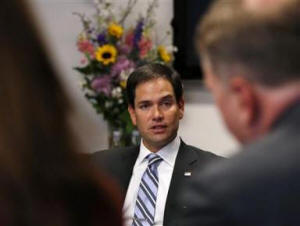|
 U.S.
senator urges budget neutrality on Obamacare risk provisions U.S.
senator urges budget neutrality on Obamacare risk provisions
 Send a link to a friend
Send a link to a friend
[April 02, 2014]
By David Morgan
WASHINGTON (Reuters)
— U.S. Senator Marco
Rubio, a prominent Republican critic of President Barack Obama's
healthcare law, unveiled legislation on Tuesday to make sure
Obamacare would not add to the deficit by compensating insurance
companies for possible losses.
|
|
 The 2010 healthcare law includes provisions to
safeguard insurers against losses if they saw unexpectedly high
enrollments of sick or older people, who are costlier to insure than
young, healthy consumers. The 2010 healthcare law includes provisions to
safeguard insurers against losses if they saw unexpectedly high
enrollments of sick or older people, who are costlier to insure than
young, healthy consumers.
The Florida senator has labeled the provisions a "bailout" for
insurance companies.
Rubio's two-page bill, dubbed "the ObamaCare Taxpayer Bailout
Protection Act," requires the administration to ensure that the
law's risk provisions "reduce to zero the cost ... to the federal
government."
"The White House has said ... it will have to be budget neutral,
that no money from taxpayers or general revenue will be spent in
bailing out the exchanges. And all I'm offering now is a bill that
will say: 'Let's codify what you've already agreed to do,'" Rubio
said at the Reuters Health Summit in Washington.

Rubio, seen as a possible White House contender for 2016, proposed
repealing the little-known risk-corridor provisions in legislation
he introduced last year.
Insurers oppose repeal of the provisions, saying they were put in
place to protect the companies against marketplace uncertainties
during the first few years of Obamacare's rollout.
The nonpartisan Congressional Budget Office predicted the provisions
would create a net gain of $8 billion for the budget over the
program's three-year life. That is because some companies that have
lower-than-expected costs would be required to share their windfall
with the federal government.
[to top of second column] |

Cigna Corp Chief Executive David Cordani told the Reuters Health
Summit he agreed with the idea that the markets needed to be
self-sustaining without artificial financial supports. But he said
risk corridors were designed to be market neutral and priced into
the products that Cigna and other insurers are already offering on
the Obamacare marketplaces this year.
"It's a fundamental part of the design of the law," Cordani said.
He said Cigna would not favor risk mitigation programs that add to
tax-funded subsidies.
But others said it was not clear how useful risk mitigation would
prove to be for insurers.
"They're super-complicated. Very few people understand exactly how
they work. They've never been tried on this scale before," Chet
Burrell, chief executive of CareFirst BlueCross BlueShield, told the
Reuters Health Summit. "How's it all going to come out? I don't
think anybody on earth can say."
(Reporting by David Morgan; editing by Caren Bohan and Peter Cooney)
[© 2014 Thomson Reuters. All rights
reserved.] Copyright 2014 Reuters. All rights reserved. This material may not be published,
broadcast, rewritten or redistributed.
 |